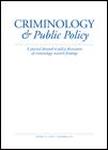版权所有:内蒙古大学图书馆 技术提供:维普资讯• 智图
内蒙古自治区呼和浩特市赛罕区大学西街235号 邮编: 010021

作者机构:Assistant Professor of Criminology and Criminal Justice at the University of South Carolina. She holds a Ph.D. in Crime Law and Justice from the Pennsylvania State University. She has previously worked as a Research Associate for the Pennsylvania Commission on Sentencing the National Center for Juvenile Justice and the Pennsylvania State Legislature. Her primary research interests center on the development and evaluation of programs and policies to prevent delinquency and crime and/or to intervene with individuals already involved in offending. She has previously published work in Criminology and Crime & Delinquency. The Deputy Director of the Pennsylvania Commission on Sentencing where she also serves as Research Director. The Commission's current research activities include an evaluation of substance abuse programs an evaluation of the new State Intermediate Punishment Program and a study of economic sanctions. Dr. Kempinen is also Senior Lecturer in the Sociology Department at the Pennsylvania State University. She has previously published in Crime & Delinquency Criminal Justice Review Federal Sentencing Reporter Justice Quarterly and The Prison Journal.
出 版 物:《Criminology & Public Policy》
年 卷 期:2006年第5卷第2期
学科分类:12[管理学] 1204[管理学-公共管理] 120401[管理学-行政管理]
主 题:Aftercare Reentry Boot Camp Recidivism
摘 要:Research Summary: This study is an outcome evaluation of a residential aftercare component provided to offenders graduating from the Quehanna Motivational Boot Camp in Quehanna, Pennsylvania. Capitalizing on a policy change that set up a natural experimental design, we use survival analysis to compare recidivism outcomes of a control group of 383 offenders, who graduated before the mandatory 90-day residential aftercare component was added, to an experimental group of 337 offenders, who graduated after the policy change. Our findings reveal that offenders who receive the mandatory aftercare component have significantly lower recidivism rates at six months, one year, and two years post-release. Policy Implications: These findings are important for policy related to both boot camp programs and offender reentry in general. First, our findings suggest that adding a residential aftercare component to a boot camp program has the potential to (1) greatly reduce failure rates and (2) increase the time to failure. Second, our findings have implications that reach beyond boot camp. As the number of incarcerated offenders returning to local communities continues to increase, offender reentry has become a national issue. Our findings are promising as they suggest that a continuum of care model designed to extend services and help offenders overcome immediate obstacles to reintegration may indeed reduce criminal recidivism.